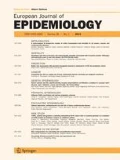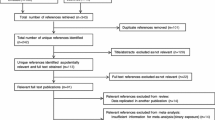Abstract
Caffeine is a commonly consumed drug during pregnancy with the potential to affect the developing fetus. Findings from previous studies have shown inconsistent results. We recruited a cohort of 2,643 pregnant women, aged 18–45 years, attending two UK maternity units between 8 and 12 weeks gestation from September 2003 to June 2006. We used a validated tool to assess caffeine intake at different stages of pregnancy and related this to late miscarriage and stillbirth, adjusting for confounders, including salivary cotinine as a biomarker of smoking status. There was a strong association between caffeine intake in the first trimester and subsequent late miscarriage and stillbirth, adjusting for confounders. Women whose pregnancies resulted in late miscarriage or stillbirth had higher caffeine intakes (geometric mean = 145 mg/day; 95% CI: 85–249) than those with live births (103 mg/day; 95% CI: 98–108). Compared to those consuming < 100 mg/day, odds ratios increased to 2.2 (95% CI: 0.7–7.1) for 100–199 mg/day, 1.7 (0.4–7.1) for 200–299 mg/day, and 5.1 (1.6–16.4) for 300+ mg/day (P trend = 0.004). Greater caffeine intake is associated with increases in late miscarriage and stillbirth. Despite remaining uncertainty in the strength of association, our study strengthens the observational evidence base on which current guidance is founded.
Similar content being viewed by others
Abbreviations
- CI:
-
Confidence interval
- IQR:
-
Interquartile range
- OR:
-
Odds ratio
- SD:
-
Standard deviation
References
Goldstein A, Warren R. Passage of caffeine into human gonadal and fetal tissue. Biochem Pharmacol. 1962;11:166–8.
Morris MB, Weinstein L. Caffeine and the foetus: is trouble brewing? Am J Obstet Gynecol. 1981;140:607–10.
Kirkinen P, Jouppila P, Koivula A, Vuori J, Puukka M. The effect of caffeine on placental and fetal blood flow in human pregnancy. Am J Obstet Gynecol. 1983;147:939–42.
Martin TR, Bracken MB. The association between low birth weight and caffeine consumption during pregnancy. Am J Epidemiol. 1987;126:813–21.
Boylan S, Cade JE, Dolby VA, Greenwood DC, Hay AWM, Kirk SFL, et al. Maternal caffeine intake during pregnancy, risk of fetal growth restriction: a large prospective observational study. BMJ. 2008;337:a2332.
Bracken MB, Triche EW, Belanger K, Hellenbrand K, Leaderer BP. Association of Maternal Caffeine Consumption with Decrements in Fetal Growth. Am J Epidemiol. 2003;157:456–66.
Bech BH, Obel C, Henriksen TB, Olsen J. Effect of reducing caffeine intake on birth weight and length of gestation: randomised controlled trial. BMJ. 2007;334:409.
Wen W, Shu XO, Jacobs DR Jr, Brown JE. The associations of maternal caffeine consumption and nausea with spontaneous abortion. Epidemiology. 2001;12:38–42.
Tolstrup JS, Kjaer SK, Munk C, Madsen LB, Ottesen B, Bergholt T, et al. Does caffeine and alcohol intake before pregnancy predict the occurrence of spontaneous abortion? Hum Reprod. 2003;18:2704–10.
Khoury JC, Miodovnik M, Buncher CR, Kalkwarf H, McElvy S, Khoury PR, et al. Consequences of smoking and caffeine consumption during pregnancy in women with type 1 diabetes. J Matern Fetal Neonatal Med. 2004;15:44–50.
Weng X, Odouli R, Li DK. Maternal caffeine consumption during pregnancy and the risk of miscarriage: a prospective cohort study. Am J Obstet Gynecol. 2008;198:279.
Mills JL, Holmes LB, Aarons JH, Simpson JL, Brown ZA, Jovanovic-Peterson LG, et al. Moderate caffeine use and the risk of spontaneous abortion and intrauterine growth retardation. J Am Med Assoc. 1993;269:593–7.
Klebanoff MA, Levine RJ, DerSimonian R, Clemens JD, Wilkins DG. Maternal serum paraxanthine, a caffeine metabolite, and the risk of spontaneous abortion. N Engl J Med. 1999;341:1639–44.
Savitz DA, Chan RL, Herring AH, Howards PP, Hartmann KE. Caffeine and Miscarriage Risk. Epidemiology. 2008;19:55–62.
Committee on Toxicity of Chemicals in Food. Consumer products and the environment. Statement on the review of caffeine. Department of Health; 1984.
Committee on Toxicity of Chemicals in Food CPatE. Statement on the reproductive effects of caffeine. Food Standards Agency; 2001.
Committee on Toxicity of Chemicals in Food CPatE. Statement on the reproductive effects of caffeine. Food Standards Agency; 2008.
Organisation of teratology information specialists. Caffeine and pregnancy; 2006.
American College of Obstetricians and Gynecologists. Education pamphlet AP001—nutrition during pregnancy. Washington, DC: American College of Obstetricians and Gynecologists; 2008.
Boylan SM, Cade JE, Kirk SFL, Greenwood DC, White KLM, Shires S, et al. Assessing caffeine exposure in pregnant women. Br J Nutr. 2008;100:875–82.
Ministry of Agriculture Fisheries and Food. Survey of caffeine and other methylxanthines in energy drinks and other caffeine-containing products (updated). Report no.: 144. London: Ministry of Agriculture, Fisheries and Food; 1998.
Cade JE, Burley VJ, Greenwood DC. The UK Women’s Cohort Study: comparison of vegetarians, fish- eaters and meat-eaters. Public Health Nutr. 2004;7:871–8.
StataCorp. Stata statistical software: Release 10.1. College Station, TX: Stata Corporation; 2007.
Wyatt PR, Owolabi T, Meier C, Huang T. Age-specific risk of fetal loss observed in a second trimester serum screening population. Am J Obstet Gynecol. 2005;192:240–6.
Gardosi J. Customized fetal growth standards: rationale and clinical application. Semin Perinatol. 2004;28:33–40.
Rosenberg L, Mitchell AA, Shapiro S, Slone D. Selected birth defects in relation to caffeine-containing beverages. J Am Med Assoc. 1982;247:1429–32.
Fenster L, Eskenazi B, Windham GC, Swan SH. Caffeine consumption during pregnancy and spontaneous abortion. Epidemiology. 1991;2:168–74.
Stein Z, Susser M. Miscarriage, caffeine, and the epiphenomena of pregnancy: the causal model. Epidemiology. 1991;2:163–7.
Sata F, Yamada H, Suzuki K, Saijo Y, Kato EH, Morikawa M, et al. Caffeine intake, CYP1A2 polymorphism and the risk of recurrent pregnancy loss. Mol Hum Reprod. 2005;11:357–60.
Acknowledgments
This research was funded by the Food Standards Agency (Contract T01032/33). We thank Stuart Creton, Clifton Gay, Gordon Gibson, David Gott, Fred Kadlubar, Mark Klebanoff Caroline Tahourdin, and Natalie Thatcher for their useful comments during the study., Heather Ong, Vilas Misty, Clare Lawrence, Chetan Ghandi, Bhavin Daudia, Sue Chell, and the Department of Chemical Pathology, University Hospitals of Leicester NHS Trust, for sample handling and processing.
Author information
Authors and Affiliations
Corresponding author
Additional information
All the authors are the members of CARE study group and see the Appendix for the contribution to authorship.
Appendix
Appendix
Contribution to authorship
Darren C. Greenwood conceived the paper, performed and interpreted statistical analyses, and wrote the manuscript. Principal Investigators were Janet E. Cade (Leeds) and Marcus S. Cooke (Leicester). Co-Investigators were Nigel Simpson, James Walker, Christopher P. Wild (Leeds) and Justin C. Konje (Leicester). All authors were given the opportunity to comment on and approve the paper.
Members of the CARE Study Group are:
Clinicians: Nisreen Alwan, Nigel Simpson (Co-Investigator), James Walker (Co-Investigator) (Leeds); Justin C. Konje (Co-Investigator), Neelam Potdar (Leicester).
Nutritionists: Sinead Boylan (PhD student), Janet E. Cade (Principal Investigator), Sara F.L. Kirk (Co-Investigator) (Leeds).
Laboratory methods: Alastair W.M. Hay, Susan Shires, Kay L.M. White, Christopher P. Wild (Co-Investigator) (Leeds); Marcus S. Cooke (Principal Investigator) (Leicester).
Statisticians: Darren C. Greenwood (Co-Investigator)(Leeds); Nicholas Taub (Leicester).
Research midwives: Vivien A. Dolby (Leeds), Karen C. Chipps, Shabira Kassam (Leicester).
Database managers: James D. Thomas (Leeds); Jim Charvill (Leicester).
Rights and permissions
About this article
Cite this article
Greenwood, D.C., Alwan, N., Boylan, S. et al. Caffeine intake during pregnancy, late miscarriage and stillbirth. Eur J Epidemiol 25, 275–280 (2010). https://doi.org/10.1007/s10654-010-9443-7
Received:
Accepted:
Published:
Issue Date:
DOI: https://doi.org/10.1007/s10654-010-9443-7



